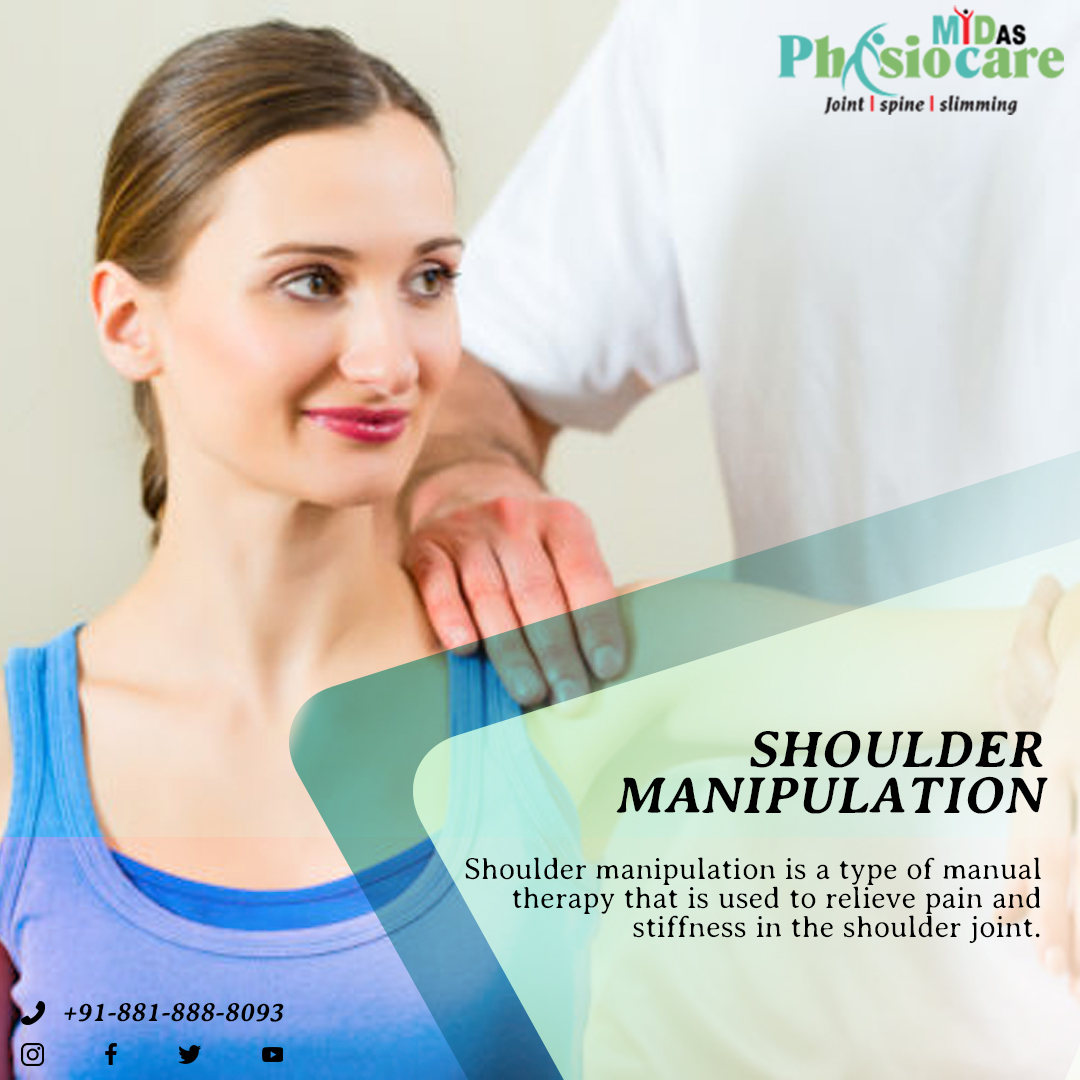Shoulder manipulation is a type of manual therapy that is used to relieve pain and stiffness in the shoulder joint. This technique involves the use of applied force to move the joint beyond its normal range of motion, which helps to break up scar tissue and improve joint mobility. To know more about Best physiotherapy center in Indore
Shoulder manipulation is typically performed by a trained healthcare provider, such as a physical therapist or chiropractor. The provider will use a variety of techniques, including stretching, deep tissue massage, and joint mobilization, to prepare the shoulder for manipulation.
During the manipulation itself, the provider will apply quick and controlled movements to the shoulder joint, typically while the patient is under anesthesia or sedation. This allows the provider to move the joint more deeply and without causing pain or discomfort to the patient.
While shoulder manipulation can be very effective in relieving pain and stiffness, it is not appropriate for everyone. Patients with certain conditions or injuries, such as fractures or rotator cuff tears, may not be good candidates for this type of treatment contact Top physiotherapist in Indore
. Additionally, shoulder manipulation should only be performed by a trained and experienced healthcare provider, as improper manipulation can lead to further injury or complications.
After a shoulder manipulation, patients may experience some soreness, swelling, or bruising in the treated area. It is important to rest and avoid strenuous activity for a period of time after the treatment to allow for proper healing. Physical therapy and rehabilitation exercises may also be recommended to help improve strength and mobility in the shoulder joint.
Overall, shoulder manipulation can bean effective treatment option for individuals who are experiencing pain and restriction of movement in their shoulder joint. However, it is important to work with a healthcare provider to determine if this treatment is appropriate for your specific condition or injury. Additionally, patients should ensure that they receive shoulder manipulation from a trained and experienced provider to minimize the risk of further injury or complications. Conatct for injury & compication contact Best physiotherapist near me
In summary, shoulder manipulation can be a beneficial treatment option for individuals experiencing shoulder pain and stiffness. However, it is important to work with a healthcare provider an effective treatment option for individuals who are experiencing pain and restriction of movement in their shoulder joint. However, it is important to work with a healthcare provider to determine if this treatment is appropriate for your specific condition or injury. Additionally, patients should ensure that they receive shoulder manipulation from a trained and experienced provider to minimize the risk of further injury or complications.
In summary, shoulder manipulation can be a beneficial treatment option for individuals experiencing shoulder pain and stiffness. However, it is important to work with a healthcare provider o determine if this treatment is right for you, as well as to receive proper care and guidance throughout the treatment process. Patience and commitment to rehabilitation exercises are also important to achieve the best results from this treatment. With proper care, shoulder manipulation can help individuals regain their mobility and alleviate their pain, leading to improved quality of life. In addition to shoulder manipulation, there are other non-invasive treatment options that can also be effective in relieving shoulder pain and stiffness. These include:
1. Physical therapy: A physical therapist can work with you to develop exercises and stretches that can help improve strength and flexibility in the shoulder joint.
2. Cold and heat therapy: Applying ice or heat to the shoulder can help to reduce inflammation and relieve pain.
3. Medications: Over-the-counter pain relievers, such as acetaminophen or NSAIDs (nonsteroidal anti-inflammatory drugs), can be helpful in managing mild to moderate shoulder pain. In some cases, prescription medications may be necessary.
4. Corticosteroid injections: These injections can help to reduce inflammation and pain in the shoulder joint. However, they should only be done under the guidance of a healthcare provider as there are potential side effects and risks associated with this treatment.
5. Rest and activity modification: Resting the shoulder and avoiding activities that exacerbate the pain an also be helpful in managing shoulder pain and allowing for proper healing. It is important to balance rest with gentle movement and activity to prevent the shoulder joint from becoming stiff or weak.
6. Posture correction: Poor posture can contribute to shoulder pain and stiffness. Working with a physical therapist to correct posture and improve body mechanics can help alleviate pain and prevent further injury.
7. Alternative therapies: Some individuals find relief from shoulder pain through alternative therapies such as acupuncture, massage therapy, or chiropractic care.
It is important to note that these alternative therapies may not work for everyone, and it is recommended to consult with a healthcare provider before trying any new treatment.
Additionally, in some cases, surgery may be necessary to treat shoulder problems that do not improve with non-invasive treatments. These can include rotator cuff tears, shoulder instability, and frozen shoulder. Surgical options may include repair, reconstruction or replacement of damaged tissues or joints.
Overall, there are many treatment options available for individuals experiencing shoulder pain and stiffness

